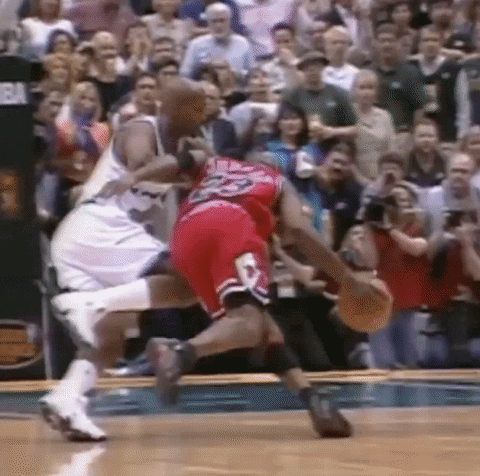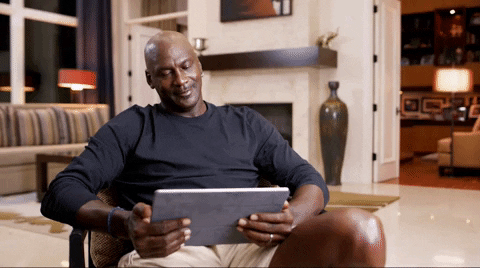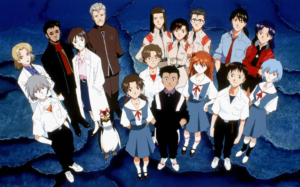Michael Jordan Was a Jerk…So?

screen shot from The Last Dance
For every story about Michael Jordan’s work ethic, there’s one about him torturing a teammate. In every tale on his determination, there’s another about him taking food from another player. Jordan has long been considered the greatest basketball player of all time, but also a very quiet figure. He doesn’t maintain a social media presence, but whenever he does something of note, the North Carolinian makes waves across today’s media landscape. With the release of ESPN’s The Last Dance, fans are reliving Jordan in his heyday. They’re also getting a chance to determine if he really is a jerk or just a very intense, winning-obsessed man.
In the 10-part miniseries, director Jason Hehir focuses on Jordan’s career through the lens of the Chicago Bulls’ 1997–98 season, intended to be the Bulls guard’s last. It constantly goes back and forth, giving insight on big career moments like the 1992 Olympics, his detour into baseball, and Jordan’s cultural impact. Hehir builds the story from as many perspectives as he could get, including former teammates and friends like Scottie Pippen and Ahmad Rashad, to noted former Chicago resident Barack Obama. It does make one thing clear though: even though Jordan made Space Jam, he wasn’t chasing Hollywood stardom. The man was chasing championships, and stardom, because of his on-court excellence, was a profit.

Jordan’s singular focus was to be the best. When he was young, the Bulls guard wanted to move past those in front of him, like Magic Johnson and Larry Bird. When he was clearly the best, Jordan was fixated on staying ahead of those behind him, like the entire league. The issue: basketball is a team sport. Jordan couldn’t win on his own, so he drove his teammates to keep up with his determination and goals.
This is where you can call him an asshole. There are stories like Jordan taking food from Horace Grant because of bad games, or punching Steve Kerr in the face. He was notorious for inventing slights in order to find motivation. Hell, Jordan basically still hates the 1991 Detroit Pistons team, because none of them shook hands with the Bulls after the ’91 Eastern Conference Finals. The Jordan Rules, a book by Sam Smith, written on the 1991–92 Bulls team, can be summarized as, “Jordan was a dick, it caused issues within the squad, but at least they won.” There’s an entire segment in the miniseries about how he bullied his teammate Scott Burrell, simply because he wanted him to be “tough enough” for the playoffs.
Jordan ran at 100% and expected his comrades to go as hard as he did. He explains that he drove teammates to be the best they could be because he was doing the same. Jordan clearly knew it wasn’t for everyone. In turn, he positions himself as the pressure that made diamonds because it wasn’t as if he didn’t ask anyone to do anything he wasn’t doing. Jordan’s work ethic is notorious, and to expect others to keep up is ridiculous, but not surprising. Championships aren’t for the lazy.
This is where the miniseries shines. It peels back at Jordan through his interactions with teammates and breaks down his obsession with winning at all things. Hell, they even talk about his gambling and the perspectives on that. It takes stories that have been around for a while and susses out what’s true, what’s not, and what needs context to it.

Now, clearly, Jordan is the hero in this documentary. He had to give permission to use the ‘97–98 season footage and is a producer on the film, which is problematic to say the absolute minimum. You can’t expect the documentary to be as investigative as others when the subject is backing it. At times, it can be seen as both Jordan propaganda and settling old beefs, but now with commentary. Jerry Krause, the Bulls’ GM at the documented time, is now dead, but that doesn’t stop them from painting him as a villain, for not keeping the band together. There are no comments from former Nike executive Sonny Vaccaro, who played an active role in Jordan signing with Nike. Nevertheless, the audience still gets an imperfect picture of a man who many people thought could walk on water.
In the lead up to the documentary, Jordan said he didn’t want to be seen as a ‘horrible guy’, which is fair. This documentary gives an in-depth look at the mentality that made him one of the greatest basketball players to play the game. It also calls him a jerk. This part of his legacy has never been questioned. Now, we have the normally quiet, Hall-of-Fame guard’s commentary and perspective. It doesn’t kill the jerk narrative, but makes his mentality a little more understandable. And if this doesn’t satisfy him, at least we got better memes than crying Jordan.



